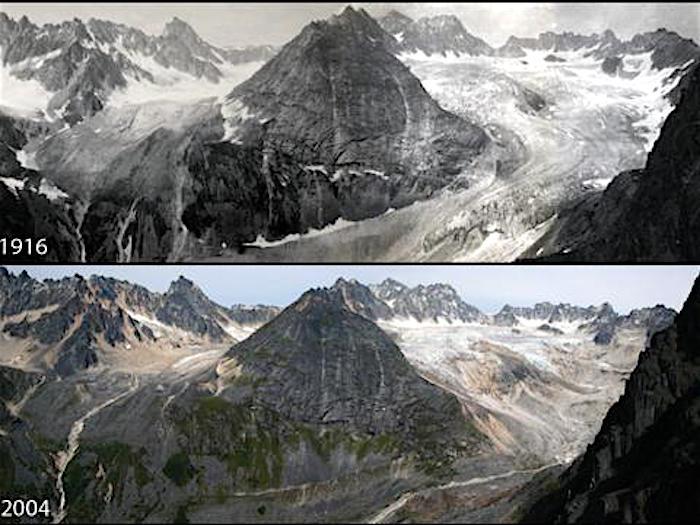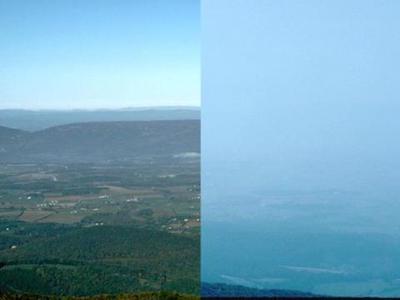
Glacial retreat in Denali National Park over the last 100 years./Top image by S.R. Capps, USGS; bottom image by NPS
An institute being formed at Duke University in North Carolina hopes to improve the health of the National Park System through research, education, and public outreach.
The Park Institute of America, a collaboration between Duke’s Nicholas School of the Environment and the Coalition to Protect America’s National Parks, announced Thursday that it aims to "promote greater use of protected public lands as long-term research sites and fund student internships and other educational programs in conservation and environmental management."
“Our parks and protected areas face mounting pressures from climate change, invasive species, pollution and other long-term environmental threats, at a time when resources to manage these lands are shrinking,” said Stuart L. Pimm, the Doris Duke Professor of Conservation at Duke.
The institute aims to address these issues, Professor Pimm said in a release. As envisioned it will sponsor research that leads to innovative management practices and enhanced training for park managers, and will work to raise public awareness of the challenges parks and protected areas face and the benefits they provide, the release said.
The Park Institute also will promote greater use of protected public lands as long-term research sites and fund student internships and other educational programs in conservation and environmental management.

Air pollution affects visibility and air quality in Shenandoah National Park/ NPS
The institute is a collaboration between Duke’s Nicholas School of the Environment and the Coalition to Protect America’s National Parks, a nonprofit organization of former National Park Service employees. It will be an independent organization housed on Duke’s campus.
A key part of the new institute’s mission, said Coalition Chair Maureen Finnerty, will be to act as a nonpartisan convener that brings together people from diverse fields, institutions, and backgrounds to identify new ways forward.
The institute plans to host ongoing scientific seminars and public meetings on park-related issues, to be held at Duke and other institutions engaged in the conservation of protected areas nationwide. It also plans to harness new communication technologies, including social media, to share the latest scientific findings with policymakers and the public.
“By providing ways to share information more freely, and in a timely and accessible manner, we can help unite a wider audience around shared goals, which is critical for forging real solutions” Ms. Finnerty said in the release. “Locating the institute at Duke allows us to leverage the university’s leadership in environmental research and education circles, which will be crucial.”
The Park Institute of America will join the E.O. Wilson Biodiversity Foundation and the Organization for Tropical Studies as leading independent nonprofit conservation organizations located at Duke.
Working with Ms. Finnerty, Duke researchers are conferring with leaders at the National Park Service and other universities and nonprofit organizations to identify the most critical issues facing parks and protected areas today and determine which parks may be best suited to serve as field research sites in the search for solutions. They are also exploring potential sources of funding to support the institute’s research initiatives and educational outreach, which may include scholarships for students to work in parks and protected areas, or new funding for citizen science programs there.
“It’s still too early to say which issues we’ll focus our resources on first. The challenge will be narrowing them down,” Finnerty said. “The glaciers in Glacier National Park are disappearing. In the Everglades, there’s a constant struggle with the quality, quantity, timing and distribution of water. And many of our national historic treasures such as the National Mall, the Statue of Liberty, and numerous coastal forts are being threatened by rising sea levels. Virtually every protected area in the nation faces critical threats. We’ve reached a tipping point where managers can no longer be reasonably expected to go it alone.”
“These parks and protected areas represent extraordinary scientific assets,” said Jeffrey Vincent, Clarence F. Korstian Professor of Forest Economics and Management at Duke. “They can serve as long-term natural laboratories to study ecological processes, climate change, natural adaptation to ecological disturbances, new approaches to multi-use resource management, and a host of other issues that affect ecosystems and communities worldwide and span the sciences and social sciences.
“The benefits of this work will extend far beyond park borders,” he said.



Comments
Awesome article and best website